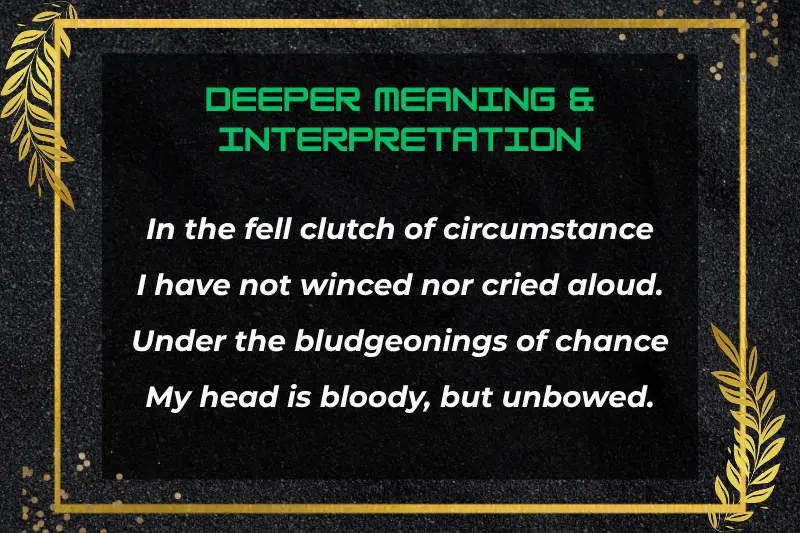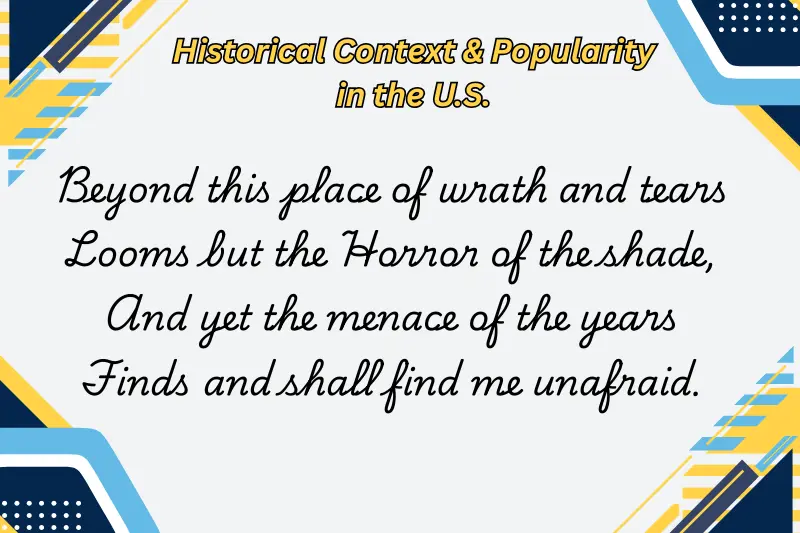Introduction
The Invictus poem is more than just lines of verse — it’s a timeless anthem of courage, strength, and resilience. Written by William Ernest Henley in 1875, Invictus has inspired generations across the globe, from prisoners to presidents. In the U.S., this poem gained major recognition when Nelson Mandela cited it during his 27 years in prison. But what makes Invictus so powerful? Let’s break down the meaning, explore its summary, and understand the unshakable message behind each stanza.
You May Also Like It:
Shakespeare Love Poetry – Timeless Romance
Famous Love Poetry That Touches the Soul
Heartfelt Love and Sad Poetry for True Emotions
The Invictus Poem (Full Text)
Out of the night that covers me,
Black as the Pit from pole to pole,
I thank whatever gods may be
For my unconquerable soul.
In the fell clutch of circumstance
I have not winced nor cried aloud.
Under the bludgeonings of chance
My head is bloody, but unbowed.
Beyond this place of wrath and tears
Looms but the Horror of the shade,
And yet the menace of the years
Finds and shall find me unafraid.
It matters not how strait the gate,
How charged with punishments the scroll,
I am the master of my fate,
I am the captain of my soul.
Summary of the Invictus Poem
Henley’s Invictus is a declaration of defiance in the face of suffering. The speaker, even while surrounded by darkness and hardship, refuses to give in. Despite fate’s cruelty and life’s punishments, he declares ultimate control over his spirit and choices. The final lines, “I am the master of my fate, I am the captain of my soul,” have become iconic words symbolizing personal empowerment.
You May Also Like It:
All’s Fair in Love and Poetry – Heartfelt 2-Line Shayari
Timeless Ancient Love Poetry – 2-Line Poems That Touch the Heart | Loyal Poetry
Heartfelt Love and Sad Poetry – Best 2-Line Shayari Collection
Deeper Meaning & Interpretation

- “Out of the night that covers me”: The “night” symbolizes pain, fear, or life’s darkest challenges.
- “I thank whatever gods may be”: A humble nod to divine forces, yet shows independence.
- “My head is bloody, but unbowed”: Life has beaten him down, but his spirit remains strong.
- “I am the master of my fate”: No matter what happens, the speaker controls how he responds.
Historical Context & Popularity in the U.S.
- Written by: William Ernest Henley after losing a leg to tuberculosis.
- Made famous by: Nelson Mandela, who recited it during his imprisonment on Robben Island.
- Referenced in pop culture: The film Invictus (2009) starring Morgan Freeman and Matt Damon.
- Used in motivational speeches: Frequently quoted by U.S. military leaders, athletes, and even in classrooms.
Why the Invictus Poem Still Matters Today

In a fast-paced, often overwhelming modern world, Invictus reminds us of our inner power. Whether you’re facing personal struggles, career setbacks, or mental health battles, these 16 lines offer hope and a call to take charge of your destiny.
FAQs about the Invictus Poem
Q1: Who wrote the Invictus poem?
A: William Ernest Henley wrote it in 1875 while recovering from illness and personal hardship.
Q2: What does “Invictus” mean?
A: It is Latin for “unconquered” or “invincible.”
Q3: Why is the Invictus poem famous in the U.S.?
A: It gained fame through its use by Nelson Mandela and its emphasis on personal freedom and resilience — key American values.
Q4: What is the tone of the poem?
A: The tone is defiant, brave, and empowering.
Q5: How is it used today?
A: It’s quoted in speeches, therapy, motivation sessions, and even tattooed as a symbol of inner strength.
Conclusion
The Invictus poem is a timeless reminder that no matter how dark the night, the human spirit has the power to rise. Its universal message of courage and control over one’s fate continues to inspire people across the U.S. and the world. Whether you’re reading it for the first time or revisiting it in difficult times, Invictus stands tall as a masterpiece of resilience.
You May Also Like It:
Mirza Ghalib Love Poetry – Be-misaal Mohabbat Ki Shayari
Urdu Love Poetry in Hindi – मोहब्बत भरी शायरी हिंदी में







